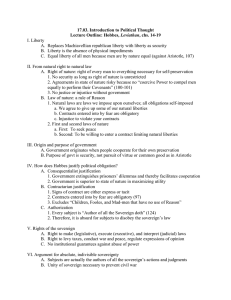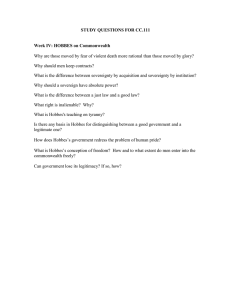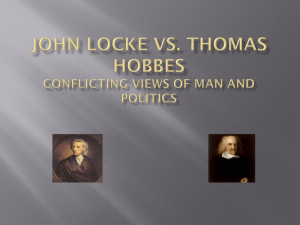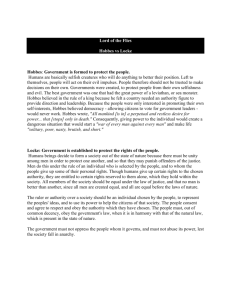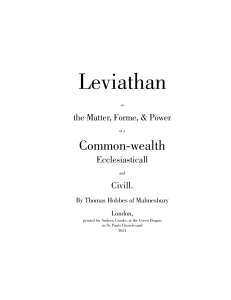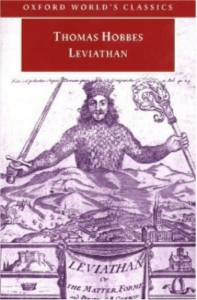Hobbes Questions: 1. What is the source of our ideas?
advertisement
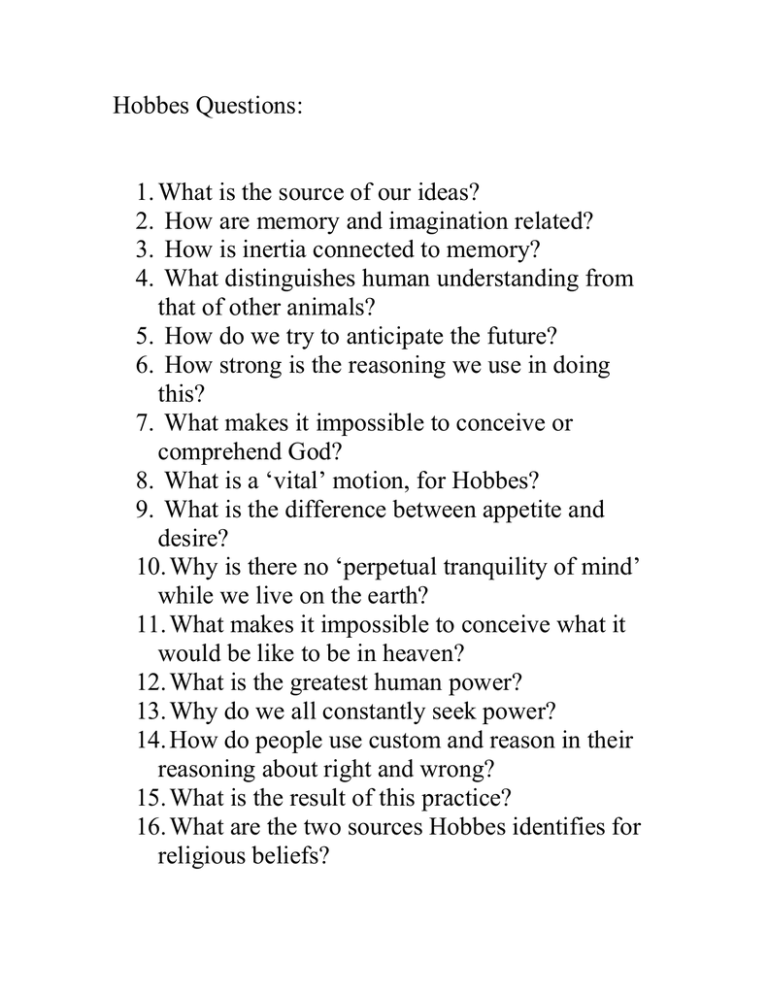
Hobbes Questions: 1. What is the source of our ideas? 2. How are memory and imagination related? 3. How is inertia connected to memory? 4. What distinguishes human understanding from that of other animals? 5. How do we try to anticipate the future? 6. How strong is the reasoning we use in doing this? 7. What makes it impossible to conceive or comprehend God? 8. What is a ‘vital’ motion, for Hobbes? 9. What is the difference between appetite and desire? 10. Why is there no ‘perpetual tranquility of mind’ while we live on the earth? 11. What makes it impossible to conceive what it would be like to be in heaven? 12. What is the greatest human power? 13. Why do we all constantly seek power? 14. How do people use custom and reason in their reasoning about right and wrong? 15. What is the result of this practice? 16. What are the two sources Hobbes identifies for religious beliefs? 17. Which of these is more important for the monotheistic religions? 18. What do we mean when we deny that God is corporeal? 19. How do (almost) all men arrive at their opinions regarding causes and effects? 20. What do those who propose or defend religions aim to accomplish? 21. How does Hobbes describe the ‘state of nature’? 22. What is a law of nature? 23. What is the first law of nature? What is the second (which follows from it)? 24. What is the right of nature? 25. How can rights be ‘laid aside’? 26. Who are the parties to the ‘social contract’? 27. What is the ‘sovereign’? 28. What right cannot be laid aside? 29. What rights are laid aside in the social contract? 30. Why can’t the sovereign do an injustice to a subject? 31. What is ‘iniquity’? 32. Why is acceptance of our equality essential to the social contract? 33. What is the ninth law of nature? 34. Why can’t someone be an arbitrator in their own cause? 35. What purpose does the ‘golden rule’ serve here? 36. What is the overarching goal that all these laws are to serve? 37. What bad impulses arise from our ‘natural passions’? 38. Why do we need a ‘visible power’ to enforce these laws of nature? 39. Why can’t our own inclinations and preference for peace be enough ensure peace? 40. Why doesn’t the example of social insects show that we don’t need an external power to ensure peace? 41. How does Hobbes feel about social discord and disagreements on policy? 42. What is a commonwealth, on Hobbes’ account? 43. What do we all give up to the state (sovereign) in forming a commonwealth? 44. What is the difference between a commonwealth by institution and a commonwealth by acquisition? 45. Why can’t the citizens of a commonwealth (by institution) withdraw their consent & choose another sovereign? 46. Why is appeal to God not a way out of this problem? 47. Who is the covenant (establishing a commonwealth by institution) with and among? 48. Why can’t the sovereign violate that covenant? 49. What is the actual effect of declaring the sovereign in violation and the covenant broken? 50. How may the commonwealth deal with a lone (or a few) dissenters? 51. How far do the sovereign’s powers of censorship extend? 52. What are the rules of ‘propriety’? 53. Why must all the essential powers of the sovereign be kept unified? 54. Why does Hobbes dismiss worries about a sovereign being corrupt or having ‘irregular passions’? 55. What is Liberty (properly speaking)? 56. Why is there (really) no such thing as freedom of the will? 57. Why does Hobbes hold our actions ‘proceed from necessity’? 58. How does Hobbes differ with those who frame their political demands as demands for ‘liberty’? 59. Why does Hobbes think so many confuse democracy with some special kind of ‘liberty’? 60. What rights does a subject retain, when a sovereign is instituted? 61. What is the general rule for this distinction between where we may refuse to obey the sovereign and where not? 62. Why does Hobbes seem to think the act of pardoning rebels can be a good idea for the sovereign? 63. What do other liberties (beyond those rights that cannot be transferred) depend on?
